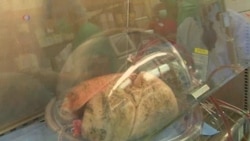WASHINGTON —
U.S. scientists are conducting a study that they hope will increase the number of donor lungs available to patients needing transplants. Their effort is aimed at finding the best way to preserve the lungs from a deceased person until they can be transplanted into a patient who needs them.
Lungs remain viable longer than other organs because of the air left inside them after a person's death. Dr. Thomas Egan, the leader of the project, said researchers hope to find a way to delay the onset of decay even more.
"This would have a profound impact on the number of lungs that are available for transplant. Right now in the United States, we do 1,800 lung transplants a year. We think that we could be doing upwards of 40- to 50,000 lung transplants a year," said Egan.
For thousands of people across the country, a lung transplant is their only hope to one day breathe normally. But harvesting the organs from donors who die suddenly, and not in a hospital, is often complicated. Because of this, up to 80 percent of donated lungs aren't usable.
While most lungs for transplants come from donors who died in a hospital, they are frequently damaged by ventilators and other complications during long hospital stays. Egan wants to reach sudden death victims in their homes, or elsewhere in the community, and have medical workers pump a little air into their lungs to preserve them while the body is transported to an operating room for organ recovery.
Egan's team’s methods include a procedure called ex vivo lung perfusion, which uses a machine to infuse air and fluids through the lungs to prolong their life. The process also allows the lungs to be inspected for disease and other potential problems.
"By doing this repeatedly, we're likely to get more efficient, which will potentially improve opportunities to not only transplant lungs but have lungs function better after recovery following sudden death," said Egan.
Lungs that pass health checks will be transplanted into patients taking part in a National Institutes of Health-funded study.
One such patient, Lisa Bowman, has been on the waiting list for new lungs for two years after a rare genetic disease gradually damaged her own. She is hoping the study will help her find a matching lung donor sooner.
"I cannot think of… anything that would be more exciting. I think that would be the greatest thing to have - to be able to breathe normal," said Bowman.
Transplant specialists around the world will be watching the program with keen interest.
Lungs remain viable longer than other organs because of the air left inside them after a person's death. Dr. Thomas Egan, the leader of the project, said researchers hope to find a way to delay the onset of decay even more.
"This would have a profound impact on the number of lungs that are available for transplant. Right now in the United States, we do 1,800 lung transplants a year. We think that we could be doing upwards of 40- to 50,000 lung transplants a year," said Egan.
For thousands of people across the country, a lung transplant is their only hope to one day breathe normally. But harvesting the organs from donors who die suddenly, and not in a hospital, is often complicated. Because of this, up to 80 percent of donated lungs aren't usable.
While most lungs for transplants come from donors who died in a hospital, they are frequently damaged by ventilators and other complications during long hospital stays. Egan wants to reach sudden death victims in their homes, or elsewhere in the community, and have medical workers pump a little air into their lungs to preserve them while the body is transported to an operating room for organ recovery.
Egan's team’s methods include a procedure called ex vivo lung perfusion, which uses a machine to infuse air and fluids through the lungs to prolong their life. The process also allows the lungs to be inspected for disease and other potential problems.
"By doing this repeatedly, we're likely to get more efficient, which will potentially improve opportunities to not only transplant lungs but have lungs function better after recovery following sudden death," said Egan.
Lungs that pass health checks will be transplanted into patients taking part in a National Institutes of Health-funded study.
One such patient, Lisa Bowman, has been on the waiting list for new lungs for two years after a rare genetic disease gradually damaged her own. She is hoping the study will help her find a matching lung donor sooner.
"I cannot think of… anything that would be more exciting. I think that would be the greatest thing to have - to be able to breathe normal," said Bowman.
Transplant specialists around the world will be watching the program with keen interest.








